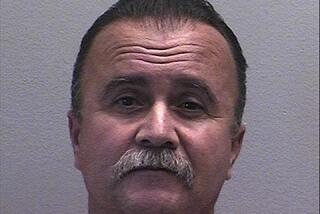Coronado Co. Lawyer : DeMassa Sentenced to 6 Months in Drug Case
- Share via
Attorney Philip DeMassa was sentenced Monday to serve six months in a halfway house for his role in the Coronado Company drug-smuggling conspiracy, bringing to a close a 2 1/2-year-old case that began and ended as a vituperative battle between the prosecution and the defense.
DeMassa, whose voice was cracked and tearful as he asked U.S. District Judge Earl Gilliam “to separate the wheat from the chaff and come to a fair result,” was smiling as he left Gilliam’s courtroom.
He had faced a maximum sentence of 20 years after pleading guilty Nov. 26 to three counts of making illegal currency transactions and one count of harboring a fugitive. Probation officers had recommended a three-year prison term in addition to the $100,000 fine that DeMassa agreed to pay as part of a plea bargain that ended his 22-day trial.
“I think it’s refreshing that the judge took an independent view of the case, made a fair sentence and didn’t succumb to the lies and misrepresentation of the government,” DeMassa told reporters after the sentencing. Gilliam ordered him to report Feb. 18 to begin his term in an as-yet-unnamed halfway house.
His attorney, Barry Tarlow, said DeMassa will be able to work during the days while spending evenings and weekends in custody.
The case created a national furor among criminal defense lawyers in April, 1983, when federal agents conducted a three-day search of DeMassa’s office and home. The U.S. 9th Circuit Court of Appeals ruled in September that the search was illegal, because it violated the right to privacy of DeMassa’s clients.
DeMassa was the lawyer for several members of the Coronado Company, a sophisticated drug ring, more than 60 of whose members have been convicted on federal charges. He was implicated in the scheme by ring leaders who became government witnesses.
The sentencing hearing--like one a week earlier that dissolved in a disagreement over DeMassa’s ability to pay the $100,000 fine--was a highly emotional proceeding.
Tarlow at first made a low-key appeal to Gilliam to recognize the financial, professional and personal punishment inflicted on DeMassa by the lengthy government investigation and prosecution.
But Assistant U.S. Atty. Joan Weber countered with a tough plea against leniency, saying DeMassa showed no remorse and little willingness to take responsibility for his role in the Coronado Company conspiracy.
“He deceived his clients, your honor, he deceived other lawyers in the community, and we believe he deceived your brethren--the other judges who sit in this courthouse and hear cases here today,” she told Gilliam.
Weber also challenged any claims DeMassa might make for lenient treatment based on concern for his family’s well-being, noting that a probation report said his marriage--the subject of divorce proceedings--was irremediably broken and that his wife accused him of physically abusing her.
Tarlow’s face was red and his voice angry when he rose to respond. He called Weber’s remarks “sleazy” and said DeMassa was given no chance to respond to his wife’s allegations.
DeMassa went further, comparing Weber to the late Sen. Joseph McCarthy, calling her a “little spoiled child” and saying neither she nor U.S. Atty. Peter K. Nunez had any sense of justice. He said, too, that he refused to “grovel” for federal prosecutors.
“The government says I have no remorse. That’s not true,” DeMassa said. “I have remorse. But I have no respect for Ms. Weber.”
More to Read
Sign up for Essential California
The most important California stories and recommendations in your inbox every morning.
You may occasionally receive promotional content from the Los Angeles Times.










